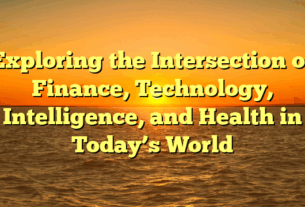In today’s rapidly evolving world, the fields of health, technology, finance, and travel are more interconnected than ever. With advancements happening across these sectors, people are experiencing transformative changes in their everyday lives. Let’s explore how these areas influence one another and what it means for the future.
Health: A Holistic Approach to Wellness
The importance of health has always been at the forefront of human concerns, but in recent years, the approach to wellness has evolved. Traditionally, health was seen primarily in terms of physical well-being. However, modern health systems now recognize the significance of mental and emotional wellness. This shift towards a holistic approach is heavily influenced by advances in both science and technology.
Thanks to cutting-edge technologies, we now have devices that allow us to monitor and improve our health in real-time. Wearables, such as smartwatches, provide valuable information about our heart rate, sleep patterns, and physical activity. Wearable technology empower users to take control of their fitness by providing feedback and offering personalized suggestions.
Moreover, the rise of telemedicine and health apps has made healthcare more accessible than ever before. Patients can now consult doctors remotely, access medical advice, and even track their symptoms. This has revolutionized the healthcare landscape, especially for those living in rural areas or those who cannot afford traditional medical visits.
Technology: The Driving Force of Change
Technology plays a pivotal role in shaping our world, and its impact is seen across all aspects of life. From artificial intelligence (AI) to virtual reality (VR), these innovations are reshaping industries and lifestyles. In the health sector, for instance, AI is being used to optimize diagnostic tools, allowing doctors to identify health issues more accurately and quickly than ever before.
Beyond healthcare, technology also drives improvements in finance, education, and entertainment. The rise of blockchain technology, for example, is transforming the way financial transactions are carried out. Cryptocurrencies, such as Bitcoin and Ethereum, offer a decentralized approach to money, challenging traditional financial systems. This has ignited debates about the future of banking and financial services.
Moreover, technology has significantly altered the way we interact with the world around us. Virtual assistants like Siri and Alexa make our daily routines more efficient, while innovations like autonomous vehicles promise to change the way we travel and commute. As technology continues to evolve, we can expect even more groundbreaking advancements that will continue to impact our lives in unforeseen ways.
Finance: Navigating the Modern Financial Landscape
Financial management has become increasingly complex as technology continues to disrupt traditional systems. The rise of digital currencies and online payment platforms has introduced new ways of conducting business and managing money. Traditional banks and financial institutions are now faced with the challenge of adapting to the digital revolution or risk being left behind.
One of the key trends in the financial sector is the growing popularity of digital finance. From peer-to-peer lending platforms to robo-advisors, fintech is democratizing financial services, making them more accessible to a wider audience. This shift is empowering individuals to take charge of their financial future without relying solely on traditional institutions.
Investing has also become more accessible due to technology. With platforms like Robinhood, individuals can buy and sell stocks with little to no commission fees. Additionally, apps like Mint and YNAB (You Need a Budget) help users manage their spending, track their investments, and set financial goals with ease.
However, the rise of digital currencies like Bitcoin has raised questions about the future of traditional banking systems. Cryptocurrencies offer a decentralized, borderless alternative to conventional banking, but they also bring new challenges related to security and regulation. As digital currencies continue to evolve, the financial sector must find ways to adapt to these emerging trends.
Travel: The New Age of Exploration
Travel has always been a symbol of freedom and adventure, but in the modern age, technology has made the world more accessible than ever before. With just a few clicks, we can book flights, accommodations, and even plan entire itineraries, all from the comfort of our homes. Online platforms like Airbnb and Booking.com have revolutionized the way we travel, offering a wide range of options to suit every budget and preference.
Technology has also improved the overall travel experience. Mobile apps like Google Maps, TripAdvisor, and Yelp provide real-time recommendations and directions, making it easier to explore new destinations. Additionally, services like Uber and Lyft have made transportation more convenient, while innovations in autonomous vehicles promise to transform how we move around cities.
Along with, the rise of remote work has opened up new opportunities for digital nomads. Professionals can now work from virtually anywhere in the world, allowing them to combine work and travel in ways that were once unimaginable. This trend has led to the creation of co-working spaces in popular travel destinations, allowing travelers to stay connected while exploring new places.
The travel industry is also benefiting from advances in sustainability. Eco-friendly travel options, such as electric vehicles and sustainable hotels, are becoming more popular as travelers become increasingly conscious of their environmental impact. Technology is playing a key role in helping the industry reduce its carbon footprint and create more sustainable travel experiences.
The Interconnection of Health, Technology, Finance, and Travel
While each of these sectors—health, technology, finance, and travel—offers its own unique advancements, the intersections between them are where the true magic happens. For example, health and technology are merging to create more personalized healthcare experiences, while finance and technology are opening up new opportunities for individuals to take control of their financial futures.
Technology also facilitates the way we travel and explore the world, making it easier to stay healthy and manage finances while on the go. Smart devices can track your activity levels during travel, helping you stay fit while exploring new destinations. Mobile banking apps make it simple to access your funds, and digital currencies offer a borderless way to handle money while abroad.
In slot demo , we can expect even more integration between these sectors. As technology continues to advance, the boundaries between health, finance, technology, and travel will become even more blurred. We may see seamless experiences that allow us to manage our health, wealth, and travel plans all through a single digital platform.
Conclusion
The convergence of health, technology, finance, and travel is shaping a new era of living. With advances in technology, individuals are empowered to take control of their health, manage their finances more efficiently, and explore the world with greater ease and flexibility. As these industries continue to evolve, we can expect even more opportunities to enhance our quality of life, making the world an even more connected and accessible place. Whether it’s through wearable health devices, digital finance tools, or the endless possibilities for travel, the future promises exciting developments in all these areas.

